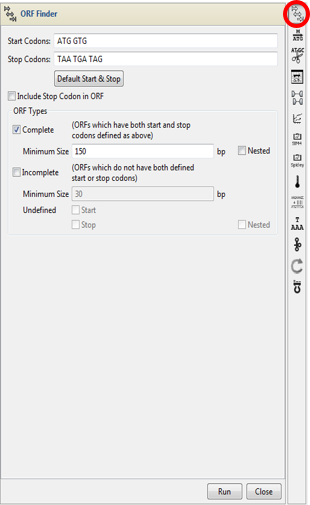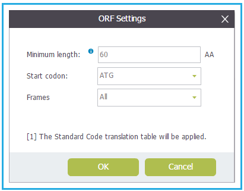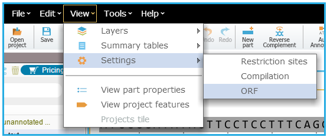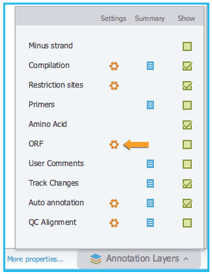3.1.15 ORF Finder a.k.a ORF Detection
Details about this feature can be found in the main Genome Compiler user guide:
See section 1.23 for ORF Detection.
To identify ORFs in a DNA or RNA sequence, in Vector NTI you click on the ORF Finder button in the Analysis toolbar of the Molecule Editor (Figure 3.1.15.1). The ORF Finder tool opens the settings for identifying ORFs within the sequence (Figure 3.1.15.1).
 Figure 3.1.15.1: ORF Finder in Vector NTI.
Figure 3.1.15.1: ORF Finder in Vector NTI.</div>
In Genome Compiler Before you run the ORF detection, you may wish to adjust the detection settings (Figure 3.1.15.2) (See section 1.23). You can access the ORF settings dialog in two ways: Either from the menu bar, by selecting "View“-"Settings“-"ORF“ (Figure 3.1.15.3) or from the Annotation Layers menu at the bottom right panel of the opened project and selecting the ORF settings icon (Figure 3.1.15.4).After adjusting the ORF detection settings click OK to start the detection. The ORFs will appear in the linear/circular views as arrows and in the sequence view as a AA sequence beneath the appropriate DNA fragment (Figure 3.1.15.5).
 Figure 3.1.15.2: ORF detection settings dialog in Genome Compiler.
Figure 3.1.15.2: ORF detection settings dialog in Genome Compiler.</div>
 Figure 3.1.15.3: Accessing the ORF settings dialog from the menu bar in Genome Compiler.
Figure 3.1.15.3: Accessing the ORF settings dialog from the menu bar in Genome Compiler.</div>
 Figure 3.1.15.4: Accessing the ORF settings dialog from the Annotation Layers menu in Genome Compiler.
Figure 3.1.15.4: Accessing the ORF settings dialog from the Annotation Layers menu in Genome Compiler.</div>
 Figure 3.1.15.5: New ORFs in Genome Compiler.
Figure 3.1.15.5: New ORFs in Genome Compiler.</div>